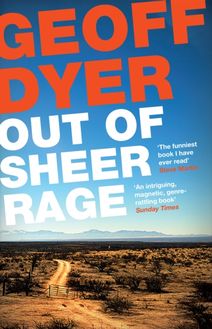-
 Univers
Univers
-
 Ebooks
Ebooks
-
 Livres audio
Livres audio
-
 Presse
Presse
-
 Podcasts
Podcasts
-
 BD
BD
-
 Documents
Documents
-
- Cours
- Révisions
- Ressources pédagogiques
- Sciences de l’éducation
- Manuels scolaires
- Langues
- Travaux de classe
- Annales de BEP
- Etudes supérieures
- Maternelle et primaire
- Fiches de lecture
- Orientation scolaire
- Méthodologie
- Corrigés de devoir
- Annales d’examens et concours
- Annales du bac
- Annales du brevet
- Rapports de stage
La lecture à portée de main
Vous pourrez modifier la taille du texte de cet ouvrage
Découvre YouScribe en t'inscrivant gratuitement
Je m'inscrisDécouvre YouScribe en t'inscrivant gratuitement
Je m'inscrisEn savoir plus
Vous pourrez modifier la taille du texte de cet ouvrage
En savoir plus

Description
Informations
| Publié par | Canongate Books |
| Date de parution | 13 juin 2013 |
| Nombre de lectures | 0 |
| EAN13 | 9781847677532 |
| Langue | English |
| Poids de l'ouvrage | 1 Mo |
Informations légales : prix de location à la page 0,0400€. Cette information est donnée uniquement à titre indicatif conformément à la législation en vigueur.
Extrait
Contents
Title Page Part One: The madman’s mill Chapter One Chapter Two Chapter Three Chapter Four Chapter Five Chapter Six Chapter Seven Chapter Eight Chapter Nine Chapter Ten Chapter Eleven Chapter Twelve Chapter Thirteen Chapter Fourteen Chapter Fifteen Chapter Sixteen Chapter Seventeen Chapter Eighteen Part Two: The hermit at bay Chapter Nineteen Chapter Twenty Chapter Twenty-One Chapter Twenty-Two Chapter Twenty-Three Chapter Twenty-Four Chapter Twenty-Five Chapter Twenty-Six Chapter Twenty-Seven Chapter Twenty-Eight Chapter Twenty-Nine Chapter Thirty Chapter Thirty-One Chapter Thirty-Two Chapter Thirty-Three Chapter Thirty-Four Chapter Thirty-Five Chapter Thirty-Six Chapter Thirty-Seven Chapter Thirty-Eight Translator’s Note Other Books By About the Author Copyright
PART ONE
The madman’s mill
CHAPTER 1
Soon after the wars, a tall fellow appeared in the canton who said his name was Gunnar Huttunen. Unlike most of the drifters who came up from the south, he didn’t go to the forestry department looking for work digging ditches, but bought the old mill on the Suukoski rapids of the Kemijoki River. This was judged to be a harebrained scheme, since, having stood idle since the 1930s, the mill had fallen into a state of extreme dilapidation.
Be that as it may, Huttunen paid the asking price and moved into the mill house. The local farmers and, in particular, the members of the Suukoski Millers’ Cooperative laughed until tears filled their eyes at the news of the sale. Apparently the world’s not short of fools, they observed to one another, even though the wars killed off a good few.
That first summer Huttunen repaired the shingle saw at the mill. He put an advertisement in the Northern News offering a reliable splitting service, and from then on, all the canton’s barns were roofed with wooden tiles split at the Suukoski mill. Huttunen’s shingles worked out six times cheaper than the factory-made asphalted felt, which, anyway, had been hard to come by since the Germans had burnt Lapland to the ground and building materials of all kinds had grown terribly scarce. Sometimes you had to hand over anything up to twelve pounds of butter at the village shop before you could load a single roll of roofing felt onto your cart. The shopkeeper Tervola knew better than anyone the going rate of his wares.
Gunnar Huttunen was almost six feet three inches tall. He had straight brown hair and bony features: a jutting chin, long nose, and deep-set eyes under a flat, high forehead. His cheekbones were prominent, his face narrow. His ears, although big, did not stick out, but lay flush against his skull. It was obvious that, as a baby, a careful eye had been kept on the sleeping Gunnar Huttunen. If a child has big ears, you must never allow it to roll over by itself in its cot; mothers must turn little boys over from time to time if they don’t want them growing up to be lop-eared men.
As lean as he was tall, Gunnar Huttunen carried himself very erect. When he walked, he took a stride at least one and a half times that of most men’s; in the snow, his footprints looked like those of an average-sized person running. At the first snowfall, he split himself a pair of skis that were long enough to touch the eaves of an ordinary house. In these, he laid broad, pretty much straight tracks and, being light, he tended to plant the poles to the same steady rhythm. You always knew immediately from the pole marks if Huttunen had been by.
No one was ever too sure exactly where he was from originally. Some said Ilmajoki, whereas others happened to know for a fact that he had come to Lapland from Satakunta. Or Laitila. Or Kiikoiset. When someone asked him once why he had moved up north, the miller had said his mill in southern Finland had burnt down. He had lost his wife in the same fire. His insurance hadn’t compensated him for either.
‘They went up in flames together,’ Gunnar Huttunen said, giving his questioner a strangely chilling look. After raking up his wife’s bones from the blackened wreckage of the mill and laying them to rest in the churchyard, Huttunen had sold the rubble and land that was now abhorrent to him, relinquished his water rights, and left the area for good. He said it had been his good fortune to find a decent mill up here in the north and, although it wasn’t working yet, the income from the shingle saw was enough for a single man to live on.
The one problem, however, as the municipal clerk made sure everyone knew, was that according to the parish records the miller Gunnar Huttunen was a bachelor. So how could he have lost a wife in a fire? This proved the subject of much debate. But no one ever discovered the truth about the miller’s past and in the end people lost interest. They simply figured that it can’t have been the first time someone’s wife had burnt, or been burnt, to death down there in the south, and they didn’t seem to be in noticeably short supply.
Gunnar Huttunen periodically suffered long bouts of depression. He would break off in the middle of whatever he was doing and stare into the distance, apparently aimlessly. Anguish glinted in the depths of his dark eyes; they became probing and caustic, and yet full of melancholy. If he caught your eye, the brilliant glitter of his stare would make you shudder, and anyone talking to Huttunen during one of his black moods would be hit by a wave of sadness and dismay.
But the miller wasn’t always low, by any stretch of the imagination. He often kicked up a tremendous ruckus for no obvious reason. He’d get up to all sorts of high jinks, joking and laughing, and sometimes cast aside all restraint to caper about on his long legs in the most comical fashion. Holding forth on this or that, he’d gesticulate wildly, cracking his knuckles, waving his arms and craning his neck as he held forth on this or that. He’d come out with incredible cock and bull stories, blithely getting people worked up just for the fun of it, or he’d slap a farmer on the back, shower him with unwarranted praise, laugh in his face, and then wink at the fellow and clap his hands.
When Huttunen was having one of these good spells, all the young people in the village would gather at Suukoski to watch the miller’s exuberant performances. They’d crowd into the ground floor of the mill, just like in the old days, and tell each other jokes and stories. In the peaceful, cheery gloom, amid the dark, heady smells of the old mill, everyone would be happy and full of high spirits. Sometimes Gunnar – or Kunnari, as they called him in the Finnish way – would light a big fire outside, and they’d feed it with dry shingles and grill whitefish from the Kemijoki.
The miller had a great gift for imitating the animals of the forest. He would make a game of it, and the youngsters would compete to see who could be the first to guess which animal he was mimicking. One minute he would become a hare, and then the next a lemming or a bear. Sometimes he would flap his long arms like a night owl, or start howling like a wolf, pointing his nose at the sky and letting out such a heart-rending wail that the terrified youngsters would huddle together for comfort.
He often did impressions of the canton’s farmers and farmwives as well, which his audiences would be equally quick to guess. When the miller transformed himself into a short, stout character which required a great deal of concentration on his part, everyone would know without a moment’s hesitation that he was imitating his nearest neighbour, fat Vittavaara.
Those were extraordinary summer evenings and nights, but people sometimes had to look forward to them for weeks on end while Gunnar Huttunen remained sunk in silent gloom. If that were the case, then no one from the village would dare go to the mill unless they had business there and everyone would try to conclude their transactions as quickly as possible, with the minimum of conversation, so daunted were they by the miller’s misery.
As time passed, Huttunen’s attacks of depression seemed to grow more acute. He was abrasive, shouting at people for no reason, and seemed permanently on edge. Occasionally he would be so overwrought and furious that he would refuse to give farmers the shingles they had ordered, and just snarl, ‘Can’t help. They’re not ready.’ Then there was nothing for the buyer to do but leave empty-handed, even if several steres of freshly cut shingle were there for all to see, neatly piled up next to the bridge.
When his mood lifted, however, Huttunen was even more peerless than ever. He performed like a circus ringmaster, his wit as sharp as the gleaming blade of the shingle saw. His movements were so quick and supple, his impressions so ebullient and startling that his audiences were utterly bewitched. Until the inevitable moment when, at the peak of his merrymaking, the miller would suddenly freeze; a harsh cry would burst from his lips and then he would be off, running out of sight behind the mill, along the rotten millrace, across the river and into the forest. He would plunge blindly through the trees, branches snapping and whistling behind him, and when he arrived back at the mill an hour or two later, tired and out of breath, the youngsters of the village would slip away home and announce in frightened voices that Kunnari’s bad days had returned.
People began to think Gunnar Huttunen was mad.
His neighbours told stories in the village of the way Kunnari had of howling like a wild animal, especially on clear winter nights when there was a hard frost. He would howl from dusk until the early hours and, if it were carried on the wind, every dog for miles around would answer his desolate outcry. All the villages along the great river lay awake on those nights and people would say that poor Kunnari really must be wrong in the head to think of getting the
-
 Univers
Univers
-
 Ebooks
Ebooks
-
 Livres audio
Livres audio
-
 Presse
Presse
-
 Podcasts
Podcasts
-
 BD
BD
-
 Documents
Documents
-
Jeunesse
-
Littérature
-
Ressources professionnelles
-
Santé et bien-être
-
Savoirs
-
Education
-
Loisirs et hobbies
-
Art, musique et cinéma
-
Actualité et débat de société
-
Jeunesse
-
Littérature
-
Ressources professionnelles
-
Santé et bien-être
-
Savoirs
-
Education
-
Loisirs et hobbies
-
Art, musique et cinéma
-
Actualité et débat de société
-
Actualités
-
Lifestyle
-
Presse jeunesse
-
Presse professionnelle
-
Pratique
-
Presse sportive
-
Presse internationale
-
Culture & Médias
-
Action et Aventures
-
Science-fiction et Fantasy
-
Société
-
Jeunesse
-
Littérature
-
Ressources professionnelles
-
Santé et bien-être
-
Savoirs
-
Education
-
Loisirs et hobbies
-
Art, musique et cinéma
-
Actualité et débat de société
- Cours
- Révisions
- Ressources pédagogiques
- Sciences de l’éducation
- Manuels scolaires
- Langues
- Travaux de classe
- Annales de BEP
- Etudes supérieures
- Maternelle et primaire
- Fiches de lecture
- Orientation scolaire
- Méthodologie
- Corrigés de devoir
- Annales d’examens et concours
- Annales du bac
- Annales du brevet
- Rapports de stage




















